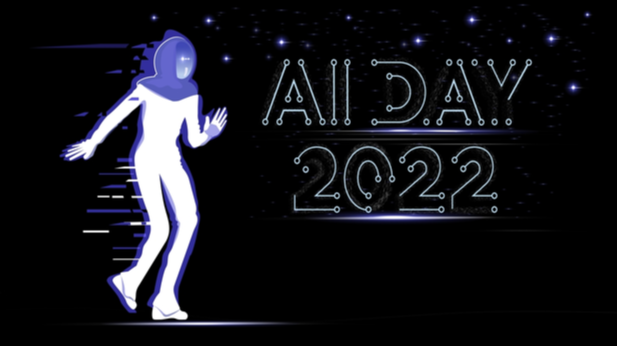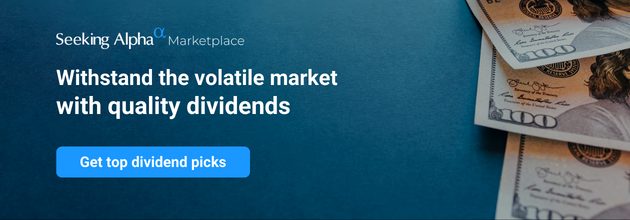 | Read in Browser |
 |
| | Top News  Shutterstock Weekend Bite, a Seeking Alpha Original Series: This week we're joined by Michael Kramer, founder of Mott Capital Management, to dive into sticky inflation, nominal GDP growth, and a bottom to watch for the S&P 500. Plus, Kim Khan gives the heads up on what to watch next week in Catalyst Watch. All eyes will be on Tesla ( TSLA) tonight as the company holds its highly-anticipated AI Day. The event is set to stretch over six hours (from 5 PM to 11 PM PT), at least according to the invitations, and be full of robotics and artificial intelligence initiatives. Note that the live event/webcast hasn't yet been posted on YouTube or the company's investor relations page, meaning there could still be some of Tesla's usual surprises. Here's what to expect: The bots: One of the main highlights is likely to be the unveiling of the company's humanoid bipedal robot called Optimus. While the concept was presented last year, many are hoping that this time around a demo will show progress of an actual functioning prototype. The robot - which has a height of 5'8' and a weight of 125 pounds - may have some practical uses in warehouses and manufacturing sites, with an ability to carry as much as 45 pounds at a walking speed of 5 mph (it uses Autopilot cameras and software to navigate the physical world). Pedal to the metal: Expect some discussion to center around robo-taxis and self-driving cars, specifically the FSD (Full Self-Driving) software system. Despite its name, the option does not yet allow cars to drive themselves automatically, a feature that Elon Musk has been promising for years. Tesla recently raised the price of its FSD Beta package to $15,000 - including sophisticated features like automatic lane-changing and parking, stop light recognition and "Smart Summon," as well as Autosteer on city streets and stop sign control. When will users be able to finally let go of the wheel? Other things: AI Day may also include an update on Tesla's Dojo Chip, which is the in-house supercomputer announced by the firm last year that is being designed to power many future Tesla products. The actual AI computing power of the Dojo Chip is considered key by Wedbush Securities analyst Dan Ives in terms of how close self-driving cars are to becoming a reality. Tesla stock has shed about 33% in value this year, compared with losses of 24% for the benchmark S&P 500. ( 64 comments) | | Featured  Amid increased market volatility, rising rates and renewed recession fears, dividends are more important than ever - so says Rida Morwa, an experienced high-yield investment strategist.
But not just any dividends. Inferior yields aren't going to cut it.
High Dividend Opportunities, Seeking Alpha's leading income service, provides their top selections in the high-yield space. Led by Rida, his team targets quality, diversification and safety, currently aiming for 8-10% yields.
Subscribe today and join the largest and fastest-growing community of income investors, save hours of investment research and be the first to know about the most compelling income ideas.
Sign up now for a 14-day free trial - and get 55% off the monthly price!Get 55% off! | | Outlook The slowdown in tech went on full display after Facebook parent Meta Platforms ( META) announced plans to reduce headcount for the first time ever. Macroeconomic headwinds are clearly hitting the sector, as well as an advertising slump that was exacerbated by Apple's ( AAPL) iOS privacy changes. Meta is also waiting for its big investments in virtual reality (Oculus), the metaverse (Horizon Worlds) and short-form video (Reels) to bear fruit, as growth peaks across Facebook, Instagram and WhatsApp. Quote: "I had hoped the economy would have more clearly stabilized by now," CEO Mark Zuckerberg told a weekly Q&A session with employees. "But from what we're seeing it doesn't yet seem like it has, so we want to plan somewhat conservatively." Budgets will be further tightened across "all teams," even among those that are growing, while priorities will be realigned to factor in the trimmed expenses. Meta, whose shares are down 60% YTD, is not alone in its downsizing efforts, with many companies implemented similar decisions over the summer. Twitter ( TWTR) froze hiring in May, Snap ( SNAP) slashed 20% of its staff in August, while Alphabet ( GOOGL) announced it would slow hiring in the second half of 2022. More tech trouble: Apple dragged down the Nasdaq on Thursday as the iPhone maker slumped following a rare downgrade by Bank of America. "We see risk to this outperformance over the next year, as we expect material negative [estimates] revisions driven by weaker consumer demand (Services already in slowdown and we expect products to follow)," analyst Wamsi Mohan wrote in a note to clients. Shares were lowered to Neutral from Buy (PT to $160 from $185), prompting the stock to drop 5% and erasing over $100B of market value. ( 62 comments) | | Economy Volatility has returned to the stock market with a vengeance as Fed policymakers remain adamant about monetary tightening to stave off inflationary pressures. On Thursday, St. Louis Fed President James Bullard said the markets have "digested" the message on rate hikes and that "seems to be the right interpretation." Another voting member of the FOMC, Cleveland Fed President Loretta Mester, also said that officials are steadfast in their mission to raise rates to a level seen as restrictive. Market movement: Despite a partial rebound in the final stages of trading, the major U.S. equity averages finished notably lower on Thursday. The Nasdaq Composite ( COMP.IND) tumbled 2.8%, the S&P 500 ( SP500) closed down 2.1% and the Dow Jones Industrial Average ( DJI) shed over 450 points. The rapid movements have intensified as hedge funds, pensions and institutional investors look to wrap up the end of the third quarter with traditional portfolio rebalancing and some new positioning. Darker times could lie ahead, according to former Treasury Secretary Lawrence Summers, who served under the Clinton administration. Summers specifically flagged the U.K.'s intervention in the gilt market, uncertainty about the path of central bank policy, "uneasiness" over decades-high price pressures and geopolitical tensions related to the Russia-Ukraine war and China. He is also known for cautioning Fed policymakers about the dangers of inflation in early 2021, when most officials were still touting "transitory" forecasts. Warning bells: "I do certainly think we're living through a period of elevated risk," Summers told Bloomberg. "Earthquakes don't come all of a sudden, there are tremors first. Most of the time, when there are tremors, they're just tremors and it goes away, but not 100% of the time. In the same way that people became anxious in August of 2007, I think this is a moment when there should be increased anxiety." ( 11 comments) | | Global Voters in Brazil are heading to the polls on Sunday for a presidential election that will determine the direction of Latin America's largest economy. President Jair Bolsonaro is running for re-election against his top opponent Luiz Inacio Lula da Silva, who ran the country from 2003-2010. It's a tense match-up between two polarizing characters, which have checkered histories that have bordered bigotry and racism to corruption scandals and even jail time.
How it works: The president will be elected to a four-year term via a two-round system, with a runoff taking place on Oct. 30 if no candidate wins more than 50% of the vote. Voting in Brazil is also compulsory from the age of 18 to 70, unless explicitly justified to an electoral court. According to the letter of the law, citizens who fail to vote in an election must pay a small fine, or else risk their passport, being employed in the public sector or other severe penalties.
Standing on the opposite sides of the economic spectrum, Bolsonaro and Lula have differing visions on how to jump-start an economy that hasn't grown over much of the past decade. Bolsonaro has campaigned on pro-business and market-friendly policies, and even eked out some reforms like a pension overhaul and privatizations. On the other hand, Lula wants bigger investments in public infrastructure, while keeping a strong grip on state-controlled oil giant Petrobras (PBR) and playing a part in the clean energy transition.
To invest? Brazil, Russia, India and China, collectively known as the BRIC nations, were all the rage in the early 2000s, when emerging market investors hoped to capitalize on their growth and population expectations, as well as commodity sources and raw materials. Barring China (and possibly India), things haven't quite materialized, but some say that could make a country like Brazil attractive given its current valuation. Brazil's Ibovespa Index is even up 3.6% this year, compared to the 24% drop of the S&P 500 in the U.S. | | Today's Markets In Asia, Japan -1.8%. Hong Kong +0.3%. China -0.6%. India +1.8%.
In Europe, at midday, London +0.2%. Paris +0.6%. Frankfurt +0.3%.
Futures at 6:30, Dow +0.3%. S&P +0.4%. Nasdaq +0.4%. Crude +0.6% to $81.72. Gold +0.3% to $1673.80. Bitcoin -0.1% to $19,498.
Ten-year Treasury Yield -5 bps to 3.69%
Today's Economic Calendar | | | | | Seeking Alpha's Wall Street Breakfast Podcast Seeking Alpha's Wall Street Breakfast podcast brings you all the news you need to know for your market day. Released by 8:00 AM ET each morning, it is a quick listen that you can put on as you get ready to start your working day. | | | | |










No comments:
Post a Comment